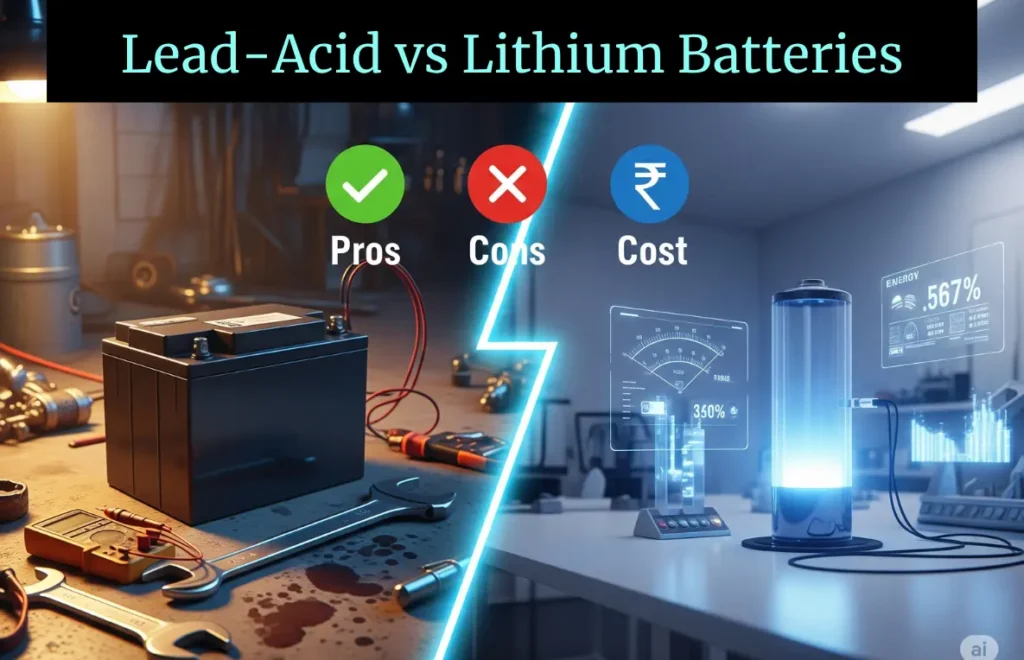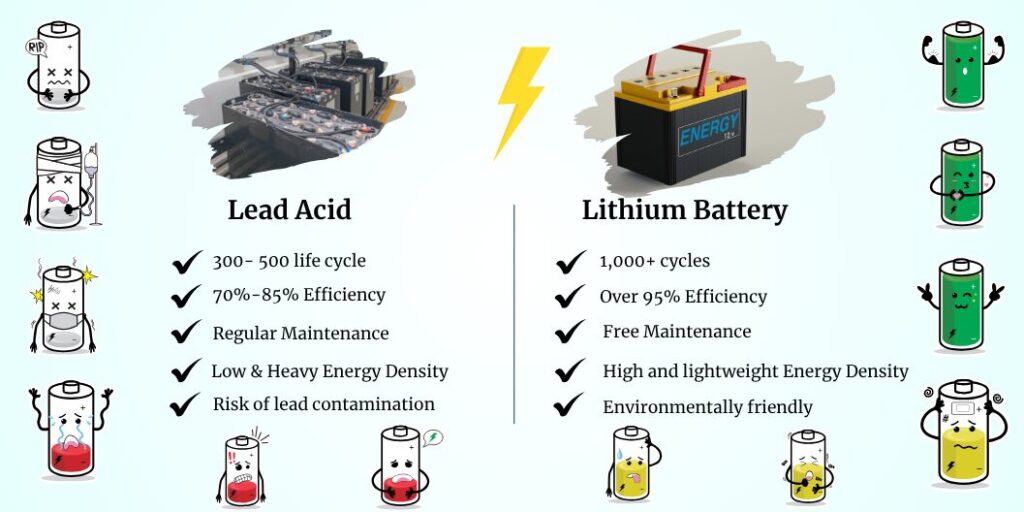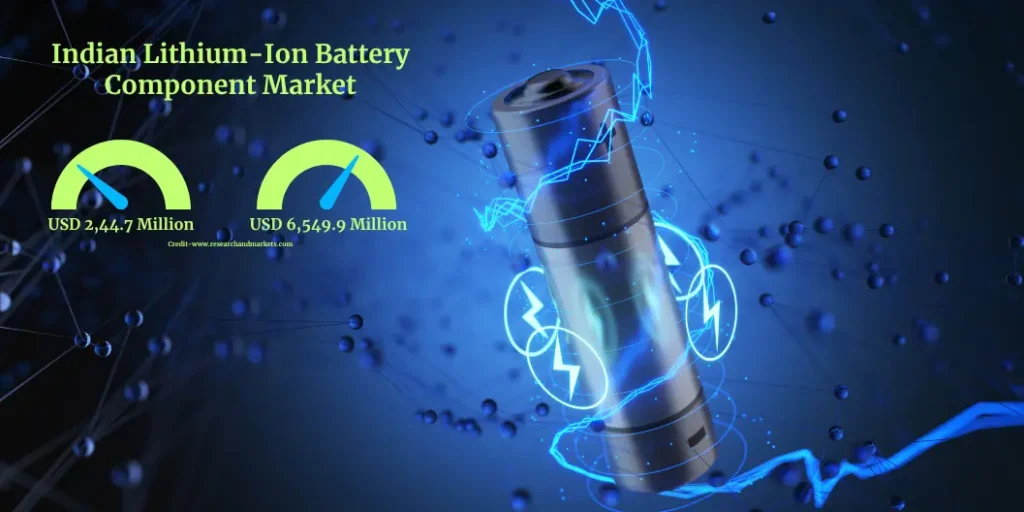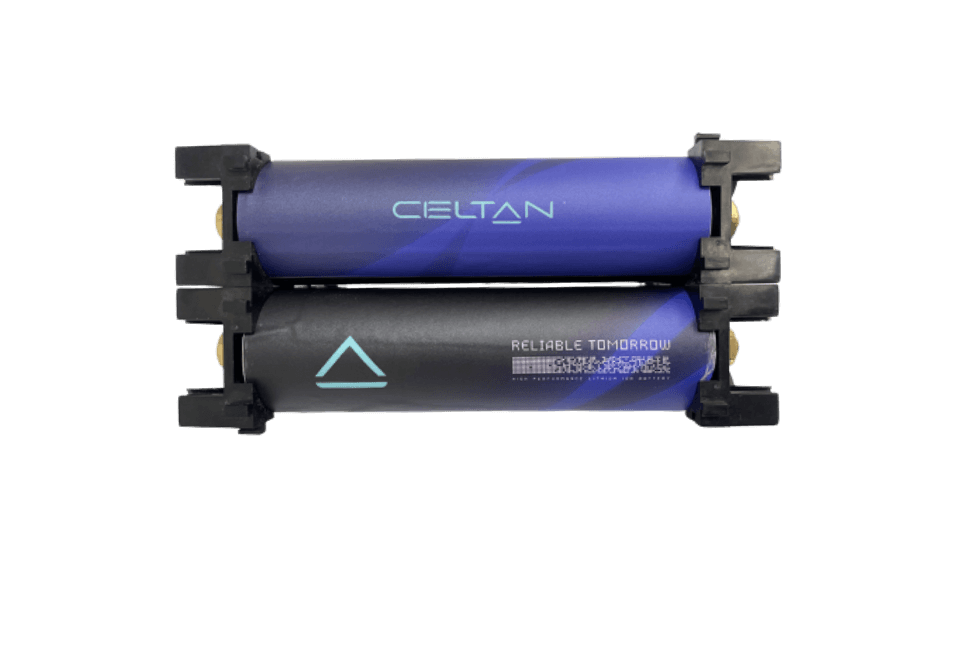Lead-Acid vs Lithium Batteries: Pros, Cons & Costs
- Pramoth Madhavan
- 4 to 5 min Read
Summary
* Deep understanding of Lithium vs Lead Acid battery.
* Lithium batteries are the best option for long-term use because of their high energy efficiency.
* Lithium batteries are lighter and more compact. It is ideal for portable applications.
* Lead-acid batteries are the best choice for customers seeking an affordable option.
* The major difference between lead acid and lithium ion batteries is their usage and performance.
* The lithium batteries require minimal maintenance, whereas the lead-acid batteries require high maintenance.
* Lithium batteries offer stable performance and a greater depth of discharge, whereas lead-acid batteries tend to lose efficiency with prolonged usage. Knowing the major difference between Lithium vs Lead acid battery is essential to make better decisions.

Lithium vs Lead Acid battery- Pros, Cons & Costs
Lead Acid vs Lithium Battery is the commonly used energy storage solution. Both battery types have different purposes and excel in specific applications. The primary difference between lithium and lead-acid batteries lies in their cost and performance.
The lead-acid batteries are known for their affordability and easy availability. Whereas, the Lithium batteries are popular for their lightweight and durability. But which one truly delivers the best value for your investment? Let us dive into the blog to know more about each one in detail.
Lead-Acid Battery
-
Lead-acid batteries are more popular due to their reliability and affordability. They are highly used in renewable energy sources and the automobile industry. Lead acid batteries have a lower energy density. They are less useful in applications where mobility is crucial since they are heavier.
Pros
- Minimal Starting Cost – The major benefits of lead-acid batteries are their affordability. They are a wise option for large-scale installations or applications with a tight budget because lead-acid batteries are far less expensive up front than lithium-ion or nickel-based batteries.
- Advanced Technologies – Lead-acid batteries have been more popular for many years. Their advanced technologies have made them more accessible. The global availability makes maintenance and replacement simple.
- Reusability – Over 95% of lead acid batteries can be recycled. They are a sustainable option.
Cons
- Heavy and Bulk – The weight and size are the major cons of lead-acid batteries. They are bulkier than lithium batteries.
- Shorter lifespan – Lead-acid batteries have a minimal lifespan than lithium batteries. They require more periodic replacements.
- Maintenance– Lead-acid batteries require regular maintenance. It includes topping up the water levels and checking the charge levels.
Cost
The price of a lead-acid battery depends on its capacity and type.
- Flooded lead-acid batteries- ₹3,000 – ₹7,000 for simple 12V units
- AGM or gel batteries- ₹7,000 – ₹15,000 or more.
Lithium Batteries
Lithium batteries have emerged as the best standard for portable power in various applications and renewable energy systems. Their appeal arises from their greater performance and efficiency as compared to traditional battery types such as lead acid or nickel cadmium. The lithium batteries have both benefits and drawbacks which are listed below:
Pros
- Higher Energy Density – The high energy density of lithium batteries is its main benefit. It is crucial for electric vehicles and mobile electronics. Lithium battery powered devices are more convenient and effective because they can run for longer between charges.
- Lightweight- They are lighter than other rechargeable batteries. It increases their effectiveness in automobile and mobile applications.
- Extended Lifespan– Lithium batteries usually have a longer life cycle. They can be charged more than 2000 times with no loss of capacity.
Cons
- Cost – The cost of the lithium batteries is high compared to other types. The high cost is due to the best quality materials used.
- Temperature Sensitivity – Lithium batteries can experience minimal performance when they are exposed to high temperatures.
- Limited Lifespan – The lithium batteries have a limited lifespan compared to other types.
Cost
The cost of the lithium batteries can vary based on the model.
- The lithium batteries for electric vehicles may cost around ₹15,000 – ₹45,000.
- Electric car lithium batteries cost around ₹1.5 lakh to ₹5 lakh. It depends on capacity (kWh).
- Solar lithium batteries may cost around ₹20,000 – ₹2.5 lakh.
Which is better lithium ion or lead acid battery? Both Lithium vs lead acid battery have their own pros and cons. You can pick the one based on your needs.
Key Difference for Better Understanding

The key difference of lithium vs lead acid battery are as follows:
|
Feature |
Lead-Acid Battery |
Lithium Batteries |
|
Energy Density |
Low and heavy |
High and lightweight |
|
Cycle Life |
300-500 cycles. It has a shorter lifespan |
1,000+ cycles. It can lasts 10+ years |
|
Efficiency |
70-85%. Higher energy loss |
Over 95%. Minimal energy loss |
|
Cost |
Lower initial cost, higher lifetime cost |
Higher upfront cost, lower lifetime cost |
|
Maintenance |
Requires regular maintenance |
Free maintenance |
|
Environmental Impact |
Easier to recycle and has a risk of lead contamination |
Environmentally friendly in use, recycling challenges |
|
Applications |
Automotive, industrial, backup power |
Electric vehicles, solar systems, electronics |
Now you may have a better knowledge of what is the difference between lithium vs lead acid battery.
Lithium vs Lead Acid battery – Which One Should You Choose?
Here are the points that help you have a clear idea of which is better lead acid battery or lithium battery:
- For Daily Commuters – The lithium batteries are an excellent choice for enhanced lifespan and performance.
- For occasional leaders and Budget Users- The lead-acid batteries are the best choice for people who are looking for an affordable option and short-term usage.
- For Heavy Loads – Lithium batteries are the ideal choice to perform with high efficiency and power.
Hope now you have a clear idea on lead-acid vs Lithium batteries and which one you should choose.

To Sum Up
Both lead-acid and Lithium batteries have their own pros and cons. The choice between Lithium vs Lead acid battery is completely based on your budget and performance needs.
Are you looking for customised batteries? Then Cellex comes as the ideal option for you. We offer the best quality batteries, customised to meet your specific needs. Our batteries are known for their longer lifespan and enhanced quality.
Connect with us to know more: Cellex India
Frequently Asked Questions
Which Battery Will Last Longer?
Lithium batteries usually have a longer lifespan of 5 to 10 times that of lead-acid batteries.
Which Battery Charges Faster?
Lithium batteries will charge faster than lead-acid batteries.
Are Lithium Batteries More Compact than Lead Acid Batteries?
Yes. Lithium batteries are more compact than lead-acid batteries.
The Major Application of Lead-Acid Batteries?
Lead-acid batteries are the ideal option for automotive applications and UPS systems.
Why You Should Buy Batteries From Cellex?
Cellex is the best option to buy batteries because of their customized options.

